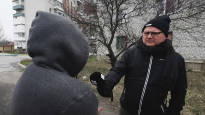LYMAN A middle-aged woman arrives at a ruined house. The house—or what’s left of it—is his home.
We are in the small town of Lyman, more than a hundred kilometers from the Russian border.
The woman blinks fearfully around.
– I don’t want to die, Victoria says.
Viktorija is not the woman’s real name. In war you have to be afraid, and even Viktorija’s fear is not without cover.
Viktorija is Ukrainian, but she supports Russia in the war.
When the Russians occupied Lyman for four months, Viktorija worked for the Russians as a kind of quarter guard.
Since then, his life has been threatened. So he is afraid of Ukrainians, his countrymen.
– A Ukrainian army car stopped next to me one evening. The soldiers opened the window and pointed at me. They said they would shoot me in the skull, Viktorija says.
Viktorija wants to present her destroyed home.
– The Ukrainians did this, he says in the apartment destroyed by the bombing, where the roof has also partially collapsed.
The sofa upstairs is hanging from a hole in the ceiling.
Viktorija has a clear understanding of the war: Ukraine is to blame for it, according to her.
Pro-Russians fear retaliation
Lyman is in ruins. From the nearby front line, the incessant rumble of cannons can be heard. 20,000 people lived in the city. Only a few thousand of them have remained in their homes.
A large part of the apartment buildings has been damaged to the point of being uninhabitable. Russia captured Lyman in early June 2022. After four months of heavy fighting in October, Ukraine had regained control of the city.
We are now looking for people who support Russia and hope for its victory in the inclement weather of the end of March. We want answers to the question of how some people can support Russia, even though they know what atrocities Russia has done to their countrymen and women.
More than 40 million people live in Ukraine, and an estimated 7.5 million of them are ethnically Russian. But what does it mean to be a Ukrainian of ethnic Russian origin?
The influence of Russia and Russian culture in Ukraine should not be underestimated. Eastern Ukraine was the same country as Russia from the 18th century. The socialist Soviet power covered not only Russia, but also the entire Ukraine between 1921 and 1991. The mother tongue of many Ukrainians other than those of ethnic Russian background is Russian.
In Eastern Ukraine, Ukrainianness and Russianness overlap and intertwine in such a way that you don’t always know what’s going on in people’s heads.
For example, how many people support Russia in the war like the woman in the ruined house? There is no answer. It is known that many changed their minds after the first Russian missiles hit Ukrainian soil.
Sergei, 62, is applying for the aid package brought to the city by the authorities. He takes the interview at first, then moves away from people’s eyes and places the Hood on his head.
– The Russians gave medicine and humanitarian aid. Life was normal, Sergei says.
Sergei’s name has been changed. He doesn’t want to appear under his own name either.
– I could have had leg surgery, but then Russia had to leave the city, explains Sergei, who uses crutches.
Sergei was born in Kharkiv in northern Ukraine near the Russian border. He lives alone. The wife died a year ago from the after-effects of the corona virus.
Russia left, the ruins remained. Ukraine’s fault, says Sergei.
– The Ukrainian army fired here. It’s the truth, and it can’t be hidden, even if no one wants to say it out loud. When the war broke out, Ukraine started bombing, Sergei claims.
Sergei plans to stay in his hometown for the rest of his life, despite the fact that at least some of the neighbors know his sympathy for Russia.
– Every one of us is quiet here, and everyone is afraid.
Natalia’s mind changed
Natalia belongs to the few Lymanians who are able to live in their own home. His name has also been changed.
The 72-year-old pensioner shares his small apartment apartment with his granddaughter.
It’s luxury at Lyman. A large part of those who remained in the city moved to live in basements when missiles, rockets and grenades destroyed the apartments.
Natalia’s father was Russian and her mother Ukrainian. He can’t really say which side of him lives stronger.
– Our family was so equal that my brother was made Russian and I was made Ukrainian, Natalia recalls her childhood at a time when Ukraine was part of the Soviet Union.
Natalia is a former warehouse manager. Before the start of the war, he watched Russian state TV channels and was pro-Russia.
– Everyone looked. And you have to believe in something. People tend to believe what they have been told.
However, his relationship with Russia has cooled over the past year.
Natalia peels potatoes on her bed and answers questions calmly. He can’t say what the Russian attack is really about.
– Nobody wants to talk about peace. Does anyone care that people die here?
Natalia smiles faintly.
– I’m not waiting for anyone here anymore. I just pray every day that my loved ones stay safe.
